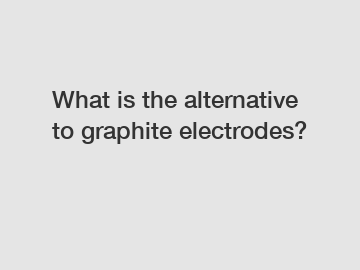What is the alternative to graphite electrodes?
In the realm of energy storage, graphite electrodes have long reigned supreme. These electrodes are essential components in lithium-ion batteries, fuel cells, and various other electrochemical systems due to their excellent conductivity and stability. However, exciting advancements in the field have now emerged, showcasing a new alternative that challenges the dominance of graphite electrodes. In this blog, we delve deep into the world of alternative electrode materials and explore their potential to revolutionize energy storage technologies.
Understanding the Limitations of Graphite Electrodes:
Before we delve into the alternatives, it is crucial to comprehend the limitations attributed to graphite electrodes. While graphite has proven to be a reliable choice, its performance can be hindered by issues such as limited energy density and slower charge/discharge rates. Additionally, graphite's tendency to undergo structural changes during repeated cycling can lead to reduced battery capacity over time.

Enter the Realm of Alternative Electrode Materials:
Now, let's uncover the groundbreaking alternatives that offer a glimpse into an energy storage future characterized by enhanced performance and efficiency.
1. Silicon-Based Electrodes:
Silicon-based electrodes have emerged as one of the most promising alternatives to graphite. Silicon offers a significantly higher energy density, making it an ideal candidate to meet the escalating demands for longer-lasting batteries. However, silicon electrodes face challenges related to their high volume expansion during charge cycles, leading to structural degradation over time. Scientists are tirelessly working to address these issues by utilizing innovative techniques such as nanostructuring and hybridizing silicon with other materials.
2. Lithium Metal Anodes:
Lithium metal anodes represent a radical departure from traditional graphite electrodes. By utilizing lithium metal as an anode material, researchers aim to significantly increase battery energy density and reduce charging time. Overcoming the challenges associated with lithium dendrite formation and low cycling efficiency are critical steps toward harnessing the full potential of this alternative.
3. Sodium-Ion Batteries:
Another alternative gaining momentum is the use of sodium-ion batteries, which replace lithium with sodium as the charge carrier. Sodium is abundant and cheaper than lithium, making it an attractive option for large-scale energy storage applications. Although sodium-ion batteries still face certain challenges, particularly in achieving high energy density and long cycle life, they hold immense promise for a more sustainable and economical future.
4. Organic Radical Batteries:
Organic radical batteries represent an unconventional alternative that harnesses organic compounds as active materials. These batteries possess unique characteristics such as high charge/discharge rates and long cycle life. By further exploring organic radical compounds and optimizing their design, researchers aim to develop safer, more environmentally friendly, and economically viable energy storage solutions.
5. Solid-State Electrolytes:
Conclusion:
As we bid farewell to the dominance of graphite electrodes, the alternatives discussed here hold immense promise for the future of energy storage. From silicon-based electrodes and lithium metal anodes to sodium-ion batteries, organic radical batteries, and solid-state electrolytes, researchers are relentlessly exploring new frontiers that promise enhanced performance, increased energy density, and improved cycle life. As science and innovation continue to push the boundaries of energy storage, we can anticipate a paradigm shift enabled by these transformative alternatives, paving the way for a more sustainable and efficient energy landscape.
For more 450mm HP Graphite Electrode , 350mm HP graphite electrode , Features of 450mm RP graphite electrodeinformation, please contact us. We will provide professional answers.

Comments
0